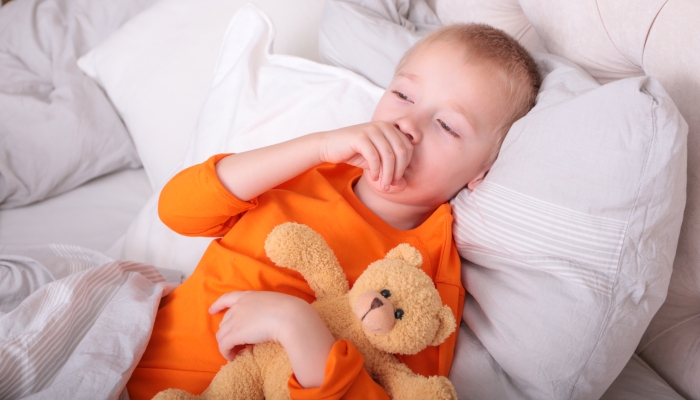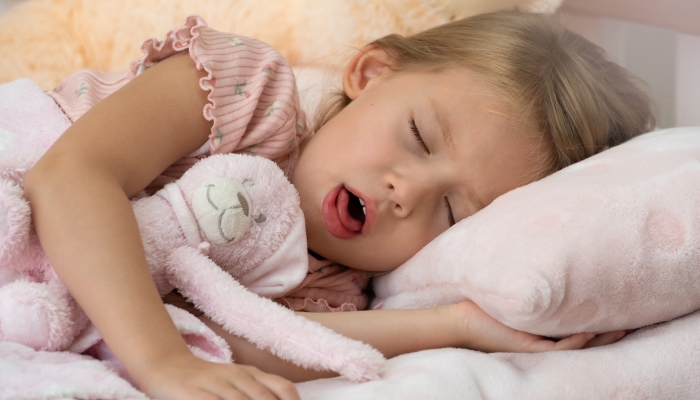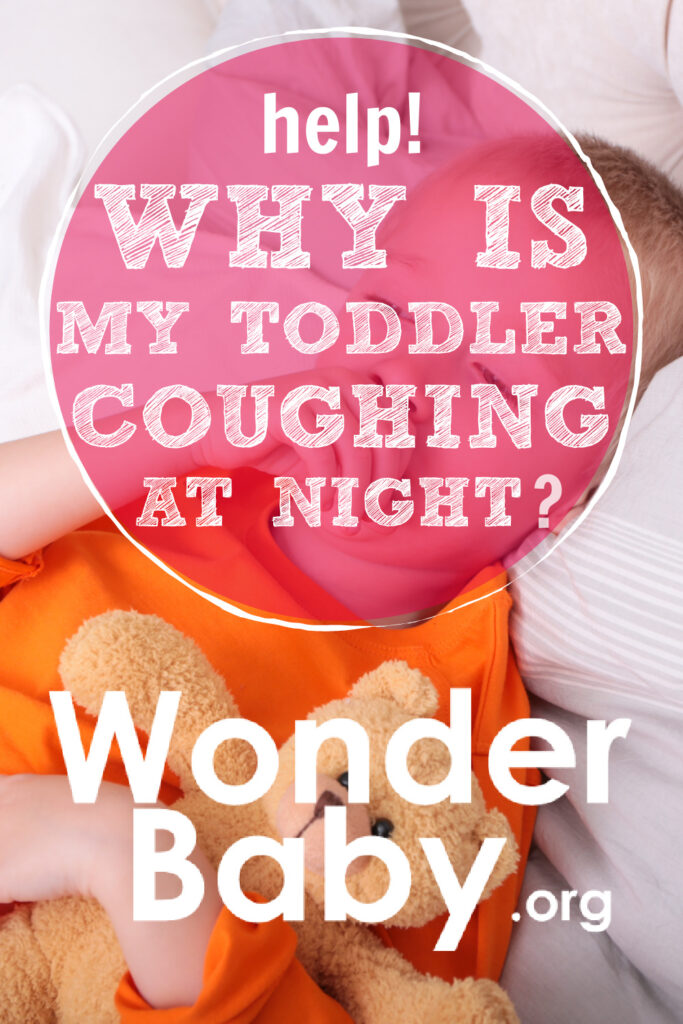Help! Why Is My Toddler Coughing at Night?

- Sick babies and toddlers often have coughs that are worse at night.
- Post-nasal drip can irritate the throat and make nighttime coughs worse.
- Cool mist humidifiers can help clear congestion while your child sleeps.
- Do not give younger children cough drops.
- If your child has difficulty breathing, take them to a doctor right away.
Sometimes it feels like toddlers are constantly fighting off different illnesses. As they start preschool or daycare, you might feel like your younger children are constantly sick. Often, your child might seem just fine during the day but struggle with coughing at night, which keeps the entire family awake.
Your child might seem completely fine during the day, only to have a persistent cough during the night. Nighttime coughs can disrupt your sleep almost as much as having a newborn and cause you to worry about your child’s health.
If you’re a parent low on sleep and worried about your child, finding out why your toddler is coughing at night is the first step toward getting some much-needed rest.
Toddler Coughing at Night: Should I Be Worried?
Most toddler coughs are caused by mild illnesses and will clear up on their own. Childhood coughs are common, and every kid is almost guaranteed to have some nighttime coughing along with other cold symptoms a few times each year. According to Ridgecrest Regional Hospital, respiratory infections are the most common childhood illness.
While you shouldn’t panic every time your child coughs, pay attention to their energy levels and breathing. If your child has a cough that lingers for several weeks or they seem to have trouble breathing, see your healthcare provider for help.
Common Causes of Nighttime Cough in Toddlers

There are many different causes of toddler coughs, and almost all of them can make coughing worse at night.
Asthma
For some children, asthma can get worse at night. According to Asthma and Lung UK, symptoms that are worse at night indicate uncontrolled asthma and may mean your child is at risk of having a serious asthma attack.
Coughing caused by asthma is often accompanied by a “wheezing” or “whistling” sound when your child exhales. For people with asthma, the airways tend to constrict, making it hard for air to move through them. This can cause a wheezing sound and trouble breathing.
Asthma should not be treated with regular cough medicines. If your child has asthma, they will need special asthma medicines. They may need daily asthma medication as well as a rescue inhaler for asthma attacks. Many children eventually outgrow their asthma.
Whooping Cough
Whooping cough, also called pertussis, is very dangerous for your child, especially a baby. It usually starts out as a mild illness and progresses to become more serious. Pertussis causes a persistent cough that can last for several weeks. It usually causes only mild illness in adults but serious problems in younger children.
If your child develops pertussis, they will have a cough that can sound awful. There is a characteristic “whoop” sound that they make as they finish a coughing fit and can finally take a breath. They may vomit after a coughing fit or seem very tired.
Young babies may never develop a cough. Instead, they struggle to breathe. Their lips and fingers may turn a dusky or blue color because they are not getting enough oxygen. This is a medical emergency—if it happens, call emergency services for help.
Fortunately, there is a vaccine that can protect your family from pertussis. Anyone who spends time around your child can help keep them safe by staying up to date on their Tdap vaccination.
Secondhand Smoke
Being near cigarettes and other kinds of smoke can trigger nighttime coughs in children. Parents smoking is harmful to their children’s health, even if smoke is kept far away from a child’s bedroom.
The CDC states that children who are exposed to tobacco smoke are more susceptible to chronic cough, sinus infection, bacterial infection, viral infection, coughing fits, and severe asthma. Any smoke that your child inhales causes inflammation to their respiratory tract, including their nose, throat, and lungs.
There are many resources available for parents who would like help quitting smoking to improve their own health and the health of their children.
Colds and Other Respiratory infections
It is impossible to avoid colds and other respiratory illnesses, especially if your child attends school or daycare. Older children who have built up some immunity usually have an easier time fighting off these viruses, but your younger child’s cough may seem like a constant presence in your home.
Mild colds can make your toddler cough and give them a sore throat or a stuffy nose. This dry cough is only a problem if it causes trouble breathing, triggers a gag reflex, or lingers for several days or weeks.
Runny noses
Some toddlers seem to have a constant runny nose. They might be wiping their nose on their sleeves nonstop or constantly in need of tissues. When a child with a runny nose lays down, all of their music drains backward down their throat, irritating the airways.
Irritation caused by drainage can make your child cough and will make their cough worse at night and early in the morning. You can help clear your child’s nose with a bulb syringe before they go to bed.
Allergies
Pet dander and pollen may be the reason for your child’s cough. If allergies run in your family, the risk of allergies is higher for your child. However, outdoor allergies are rare in younger children.
How Long Does Nighttime Cough in Toddlers Usually Last?
Your toddler’s cough probably seems like it is never going to go away. A nighttime cough that doesn’t let you or your child sleep makes a few days seem like an eternity. Most toddler coughs last 3-5 days when they are caused by respiratory infections.
If your child develops a chronic cough that lasts longer than a week, see your healthcare provider. A long-lasting cough may be a sign of a more serious infection or a chronic problem like asthma or exposure to secondhand smoke.
Tips to Help Relieve Toddler’s Cough at Night

While a child’s cough will usually resolve on its own, there are a few things you can do to help your child stop coughing all night long.
Cool Mist Humidifier
The cool air and humidity of a cool mist humidifier can help soothe your child’s airways. Never use a warm humidifier in your child’s room, since the hot water can burn your child if they get too close.
Be cautious with any essential oil diffusers in your child’s room. Some essential oils are not safe for young children, and no essential oil is approved for use in children under three years old.
Warm Shower
If you want to use warm steam to help with coughing, you can help your toddler take a warm bath or shower. Alternatively, you can take a hot shower with your toddler in the room. Either way, the steam can help clear up their sinuses and relieve their cough.
Hydration
Keeping your child hydrated can loosen mucus and help them keep their airways clear. You can give your child warm liquids or cold liquids, just choose whichever they prefer and are more likely to drink. Cold popsicles or frozen yogurts are great options to soothe a child’s sore throat.
Clean Sinus Cavity
Since most coughs are caused by irritation of the airways, you can help by cleaning out your child’s sinus cavity before they go to bed. Use a bulb syringe to remove mucus from their nasal passages and help them sleep.
Medicines
The American Academy of Pediatrics advises parents to avoid cough medicines for children younger than 6 years old. Cough suppressants, even those in OTC cough medicine, can be dangerous for young children.
If your child has a fever, you can give them children’s acetaminophen or ibuprofen to help keep them comfortable.
If your child’s cough is caused by allergies, you can talk to your doctor about using medications like Claritin or Zyrtec. These are approved for children as young as 6 months old.
When to Consult a Doctor for Your Toddler’s Cough
It can be hard not to worry about a child who is coughing at night. Most toddler coughing is not dangerous, and it will clear up within a few days. However, if coughing is accompanied by the following symptoms, you should seek medical care right away.
- Harsh breathing or difficulty breathing
- Cough lasting longer than a week
- Blue or dusky color lips, fingers, or toes
- A wheezing or whistling sound when your child breathes
- High fevers
- Lethargy or difficulty waking your child
Toddler coughing can be a symptom of everything from a common cold to a more serious illness. If you are ever worried about a persistent cough, it is worth a visit to your child’s doctor.
FAQs
Is nighttime cough contagious?
Coughs may or may not be contagious, depending on their cause. Viruses and bacterial infections are easily spread from person to person, and illnesses like pertussis are highly contagious. Coughs caused by allergies, tobacco smoke, and asthma are not contagious.
Can essential oils help my baby’s cough?
Adding essential oils to a diffuser is a popular way for many adults to clear up a cold. The experts at the Children’s Hospital of Philadelphia recommend waiting until your child is at least three years old before exposing them to any essential oils.
If your child is three years old, stick to essential oils that have been proven safe for use in children. These include lavender, peppermint, ginger, and citruses such as sweet orange or mandarin.
Is it safe to use Vicks VapoRub on toddlers?
There are special toddler formulations of vapor rubs that are marketed for children. If your child is under the age of 2, it is best to avoid all types of VapoRub, even on just their feet. Vicks VapoRub is toxic if ingested, and babies love to chew on their hands and feet. If your child gets any VapoRub in their mouth, they may feel nauseated or vomit. It can also cause burning and irritation of the eyes.

The information WonderBaby provides is not intended to be, and does not constitute, medical or other health advice or diagnosis and should not be used as such. Always consult with a qualified medical professional about your specific circumstances.
Related Posts

Eye Conditions and Syndromes, Visual Impairment
Neuralink Announces Plans to Restore Sight to the Blind with Brain Chip
Elon Musk’s company Neuralink has announced plans to begin human trials of its new “Blindsight” brain chip by the end of 2025.

Health & Nutrition
Can Baby Skin Care Products Expire?
Is that forgotten tube of diaper rash cream still safe to use? Learn more about the expiration dates of popular skin care products for infants.

Health & Nutrition
Boosting Immunity in Kids: 3 Tips for a Healthy Winter
Parents can help boost their kids’ immunity during cold and flu season by maintaining healthy eating, sleeping, and exercising habits in the winter.